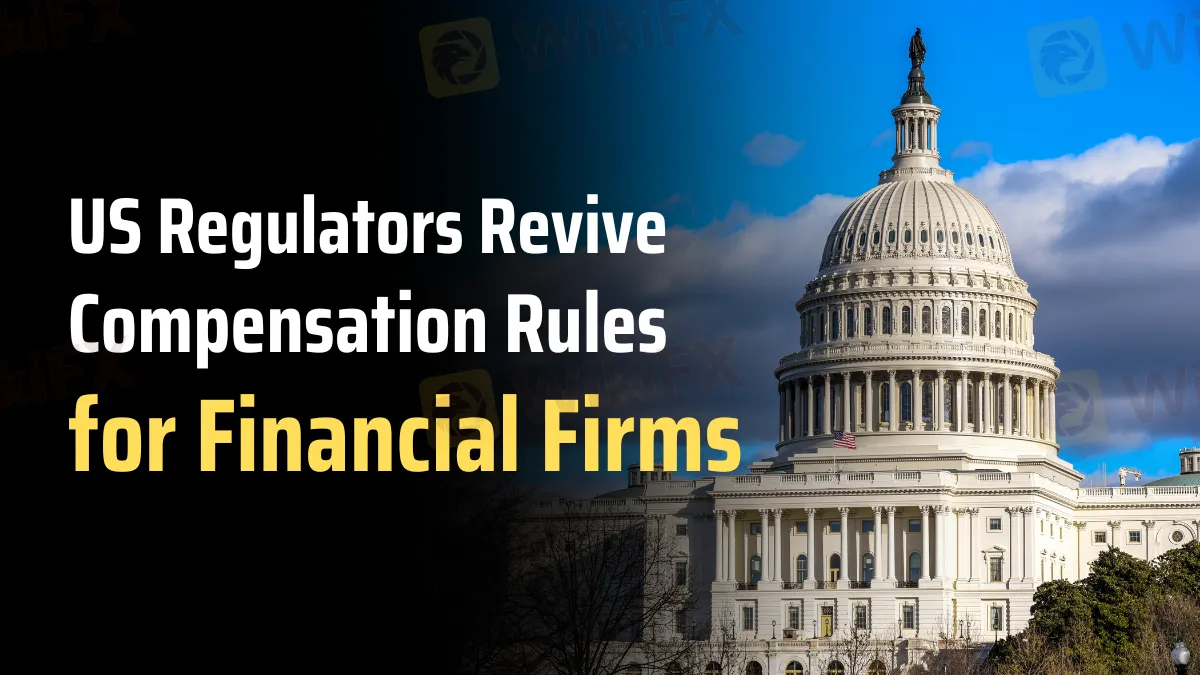WikiFX Spring Festival Message | Grounded in Transparency, Walking with Trust
As the Lunar New Year approaches, renewal is in the air. It is a moment to bid farewell to the old, welcome the new, and reflect while moving forward.
简体中文
繁體中文
English
Pусский
日本語
ภาษาไทย
Tiếng Việt
Bahasa Indonesia
Español
हिन्दी
Filippiiniläinen
Français
Deutsch
Português
Türkçe
한국어
العربية
Abstract:Federal agencies propose risk-sensitive executive pay plans to prevent excessive risk-taking.

Significantly, US bank authorities have rekindled attempts to put into effect long-delayed compensation regulations meant to increase the risk sensitivity of CEO pay schemes in financial companies. The regulation, proposed jointly by the Federal Deposit Insurance Corporation (FDIC), the Office of the Comptroller of the Currency (OCC), and the Federal Housing Finance Agency (FHFA), would outlaw incentive-based systems that do not consider risks or permit pay forfeitures and clawbacks. This repeated attempt is part of a larger effort to improve financial stability and stop CEOs of financial institutions from taking on too much risk. It follows a 2016 plan.
FDIC Chairman Martin Gruenberg emphasized the need to address unfair pay practices, particularly in large financial institutions. Such behaviors, he said, may have a huge influence on the whole financial system. The bankruptcy of Silicon Valley Bank the previous year brought to light the need for strong compensation regulations to reduce risk.
Industry players have criticized the plan, however. The new regulations would apply to banks with assets over $1 billion, with the harshest restrictions imposed on those with holdings exceeding $250 billion. Representing bigger banks, the Bank Policy Institute wrote down the proposal as “purely political.”
Because the FDIC, OCC, FHFA, National Credit Union Administration, Securities and Exchange Commission, and Federal Reserve all need to agree, putting these regulations into practice has been difficult. While the NCUA is anticipated to approve the idea shortly, the SEC has it on its calendar for rulemaking.
Jerome Powell, the Federal Reserve chairman, has not pledged to issue the rule this year. Powell wanted a strategy that effectively handled the risks involved with compensation and emphasized the need to understand the problem. The government delegate emphasized the need to consider existing industrial practices and reiterated the commitment to cooperate with other authorities.
Finalizing any new regulations requires public input. The agencies will keep getting comments on their websites as long as none of the regulators provide a coherent plan. The redoubled attention on compensation regulations highlights the continuous efforts to protect financial stability and encourage prudent risk management in the sector.

Disclaimer:
The views in this article only represent the author's personal views, and do not constitute investment advice on this platform. This platform does not guarantee the accuracy, completeness and timeliness of the information in the article, and will not be liable for any loss caused by the use of or reliance on the information in the article.

As the Lunar New Year approaches, renewal is in the air. It is a moment to bid farewell to the old, welcome the new, and reflect while moving forward.

As the new moon rises, the month of Ramadan begins. It is a time for reflection, self-discipline, and greater care for family and community. Many people adjust their daily routines, slow down their pace, and focus more on personal and spiritual well-being. However, financial markets do not pause for holidays.

WikiFX Elite Club Focus is a monthly publication specially created by the WikiFX Club for its members. It highlights the key individuals, perspectives, and actions that are truly driving the forex industry toward greater transparency, professionalism, and sustainable development.

WikiFX Elite Club Focus is a monthly publication specially created by the WikiFX Elite Club for its members. It highlights the key figures, perspectives, and actions that are truly driving the forex industry toward greater transparency, professionalism, and sustainable development.
